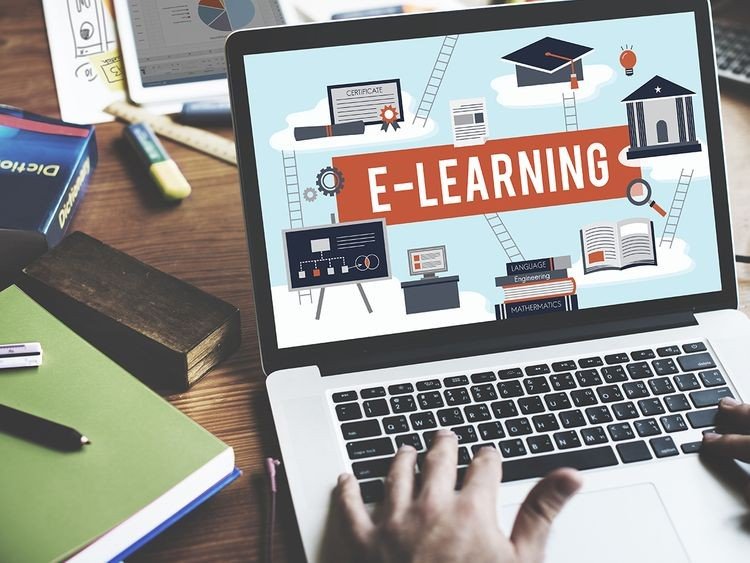COVID-19: Embracing the new 'normal' in education
E-Learning: A new era in education
Image: Shuttershock (2019)
2020: The year that has tried and tested us all. It's no doubt that this global pandemic has affected nearly every industry internationally, and let's face it; the rapid spread of COVID-19 has well and truly rocked the world of education as we once knew it. Schools began closing before our very eyes and suddenly 'online teaching' became the latest and greatest buzz words being apprehensively echoed around educational institutions.
Not surprisingly, the initial reaction I witnessed from teachers globally was panic. Sheer panic. What will we do now? How will we teach? How can we possibly assess students online? I don't 'do' technology. What's that? You want me to live teach and record myself prior to the lesson? The panic was real.
But here's the question. Can we honestly blame teachers for adopting a fearful and somewhat resistant attitude towards E-learning? Some may ask "what's the big deal? It's just teaching with technology", and this is a valid point. In recent years, industries such as commerce, engineering, tourism and construction have experienced monumental changes due to the rise of technology. Let's face it, ICTs have become a central element of everyday human operation. In a society where our demands can be met with the mere click of a button or the scroll of a thumb, it's undeniable that the integration of technology has altered the world we once knew. And let's not forget the significant role that social media has played in transforming industries. Studies have estimated that over three billion businesses utilise social media as a marketing method and social media visibility has become an essential component in measuring the success of an organisation.
But here's the issue that wreaked much havoc and fear for educators when COVID-19 graced us with its presence. When we compare the statistical growth in engineering, commerce, marketing, construction and retail companies who integrate technology into workplace operations with the current implementation of ICTs in education, the data doesn't lie. There is a significant gap that begs us to question why the educational world has failed to approach technological advancements with the same level of gumption. Well, until Coronavirus, that is.
Now as an educator, you may argue that "I use PowerPoint, Google Slides, Google Classroom, Email and Padlet on a regular basis. I'm tech-savvy." But the difference between using technology for mechanical purposes as opposed to implementing technology to improve learning outcomes is an entirely different argument. Ask yourself: Is incorporating ICTs into my lessons a mere 'box ticking' exercise, or am I using technology as a tool to enhance and deepen levels of student learning? And secondly, am I well prepared to do the latter? After interviewing a range of teachers from varying faculties in Australia, New Zealand, South Africa, Singapore and the Middle East, one thing was made increasingly clear: educators in 2020 were ill-prepared for online learning.
As a secondary school teacher, leader and post graduate student, it's my belief that Coronavirus, however catastrophic, was the disruption that the education world so desperately needed. We needed to realise that there are more ways to teach our students than that which is 'tried, tested and commonplace'. We needed to start embracing technology, rather than choosing to ignore its existence. And finally, we needed to be pushed outside of our comfort zones in order to improve our own teaching praxis.
In saying this, the question remains as to how well equipped teachers are for online learning. Many have commented that their teaching lives have been 'transformed', while others note that it was 'one of the most challenging times' in their career. And of course, there are many educators who 'simply can't wait to get back to normal teaching.'
Image: Shuttershock (2018)
The latter raises an important question for us all. Can we as teachers ever go back to "normal"? And would it be wise of us to do so? While many educators may feel more prepared for the online world now, than prior to COVID, we must remember that there is a huge distinction between "emergency remote teaching" and authentic online learning. We are not masters yet. We have much to learn. And we must use this time of change, this time of challenge and of uncertainty, to broaden our scope as educators. The world is changing - and rapidly at that. It's time that we 'got with the program' and embraced our 'new normal'.
Will you still initiate a recorded teaching lesson, and dabble in the Flipped Classroom approach? Or will you choose to revert back to the old faithful direct instruction approach (more commonly known as death by PowerPoint)? Will you, as a leader, encourage online meetings where possible to create a time-efficient workplace? Will you record vital lesson content via YouTube to allow for 24/7 student access, or will you spend yet another lunch break explaining and reiterating content to "that student" time and time again?
From one educator to another - let's embrace change, let's be innovative and let's rise to the occasion. The future of our noble profession depends on it.
- Stephanie Martin (2019)


